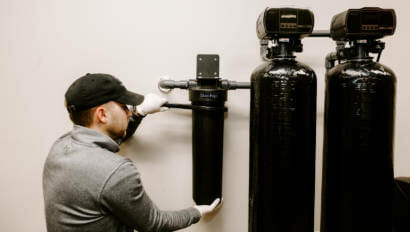Frequently Asked Questions Regarding PFAS
What are PFAS?
PFAS (Per- and Polyfluoroalkyl Substances) are a family of manmade chemicals that have historically had many different applications and uses. From firefighting foam, non-stick pans, and plastic packaging, they have found a way into everyday life. These nearly 5000 different chemicals have saturated both ground and surface water as well as soil exposing over 200 million Americans. They are incredibly hard to break down in nature. While there are finally studies and regulations being spun up, there is still a very long road ahead to fully combat these chemicals.
There are 6 major PFAS chemicals Massachusetts monitors (Referred to as PFAS6) include:
- Perfluorooctane sulfonic acid
- Perfluorooctanoic acid
- Perfluorohexane sulfonic acid
- Perfluorononanoic acid
- Perfluoroheptanoic acid
- Perfluorodecanoic acid
What are the effects of PFAS?
Whether you are exposed to PFAS from your water, clothes, or from a different source, PFAS are incredibly damaging and toxic to humans. Recent studies have begun to enlighten us to the full scope of the effects on the body. So far, we know that PFAS can cause a litany of issues including but not limited to:
- Birth defects, and general disruption in child development and growth
- Severe damage to kidneys and liver
- Infertility
- Increase risk of many forms of cancer
- Immune system suppression
- Increased cholesterol
What are the regulations regarding PFAS in Massachusetts?
Massachusetts recently passed what is considered to be some of the most stringent regulations in the country regarding PFAS exposure. Currently, the state has a limit of 20 parts per trillion of combined PFAS6 chemicals. Any town found above this limit is subject to fines and must work to upgrade their municipal water systems to ensure proper decontamination of the chemicals.
What can I do to protect my home?
PFAS in your water can be addressed with the installation of either a specialized whole-home filtration system or a point-of-use reverse osmosis system. A whole-home filtration system is installed where water enters your home, targeting PFAS as well as many other contaminants including lead to provide additional protection for your entire home.
Bluedrop offers a whole home (point-of-entry) filtration system that has been tested and third-party certified as required in the NSF/ANSI P473 standard for PFOA/PFOS, along with NSF/ANSI 53 standard for the reduction of lead and cyst.
Additionally, Bluedrop offers point-of-use Reverse Osmosis systems that can be installed under your kitchen sink to provide purified water for drinking and cooking. Reverse Osmosis is commonly used by bottled water companies to purify water and is highly effective against PFOA/PFOS and numerous other common contaminants.
Is my town affected by PFAS?
As of March 2022, the Massachusetts towns affected by PFAS are as follows:
Acton, Abington, Randolph, Littleton, Natick, Rockland, Chatham, Holbrook, Mansfield, South Easton, North Easton, Dudley, Maynard, Plainville, North Attleboro, Duxbury, Woburn, Norwell, Hanover, Wellesley, Yarmouth, Westfield, Ayer, Boxborough, Carlisle, Hudson, and Mashpee.
Don’t see your affected town on the list? Let us know!
Bluedrop Water – Trusted Water Filtration Partner
Here at Bluedrop, we take pride in giving our customers access to safe, great-tasting drinking water. Engaging with Bluedrop means that we will start by analyzing your existing water quality and determining the best strategy to tackle any potential issues, including PFAS contamination. Learn more about our mission and our residential products.


